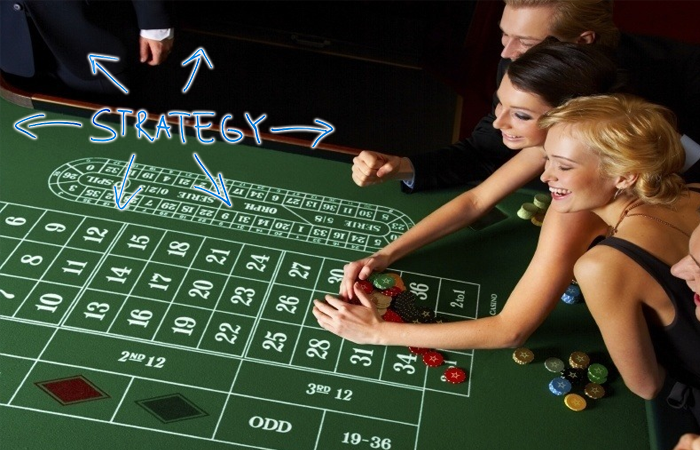Is There a Gambling System That Never Loses?

Gamblers are always interested in the Holy Grail strategy that’ll yield guaranteed profits with minimal effort. Such is the motivation behind gambling systems, which involve betting in a specific pattern to win profits.
Many brilliant mathematicians have designed gambling systems in hopes of beating the casino. But we’re led to believe that every betting system will eventually lose.
Is this really the case?
Let’s discuss this matter by going over the basics of a gambling system, 2 strategies that work, and 3 traditional systems that don’t lose very often.
What Qualifies as a Gambling System?
A gambling system is a structured betting approach that involves using patterns to overcome the house edge.
The most common examples of betting systems include the D’Alembert, Fibonacci, Labouchere, Martingale, and Paroli. These strategies meet the definition above and have been used by gamblers for centuries.
The problem with traditional gambling systems is that they don’t alter your odds of winning. Instead, these strategies merely attempt to manipulate results through betting patterns.
But if you’re willing to expand your definition of a gambling system, then you can find strategies that work over the long term.
This is why I’m going to cover both gambling strategies that are used in skill-based games, along with a few common systems that can usually work.
Two Betting Systems That Are Guaranteed to Work
The only way to truly beat the house is by playing skill-based games where you can gain an advantage. This means that you have to find a combination of a beatable game along with a gambling system that works.
Here are two gambling systems that you can use in conjunction with advantage play to earn long-term profits.

Value Betting
Value betting involves wagering a specific amount of money in order to extract maximum value in advantageous situations.
The two games where value betting works best are poker and blackjack card counting.
Value betting is especially popular in poker when you believe that your hand is superior to an opponent’s hand. The goal in this situation is to wager enough to get the most of money out of your opponent without convincing them to fold.
Here’s an example:
- The flop is Ad Qs 7h.
- You have Qd Qh for a set.
- You believe that your opponent has a pair of aces.
- You bet just enough to convince your opponent that you may have queens.
- The goal is to get them to call and pay off your set of queens.
Blackjack card counters also use value betting when they believe that the count is in their favor. The goal is to bet the highest amount in these situations to extract maximum value from the favorable count.
However, card counters must also be adept at bet spreading in order to make themselves look like regular players. In other words, going from the table minimum bet to the table maximum will attract suspicion and possibly get you kicked out the casino.
Will you always win with value betting?
No. But the key is that skilled players will win the majority of the time with value betting and reap long-term profits.
I realize that value betting isn’t considered the same type of gambling system as the Fibonacci or Paroli. But this is nonetheless a system that relies on betting the right amount when the odds are in your favor.
The biggest downside to value betting is that you have to be both skilled and experienced in the game you’re playing. Furthermore, it takes lots of work to fine tune your betting skills to the point where you can make consistent profits.
No beginning poker player will walk into the casino and immediately start value betting like a pro. But if you’re willing to put the work in, this is a system that works to bring you long-term winnings.

Never Bet More Than 2% of Your Bankroll in Skill-Based Games
Most gamblers are undisciplined with their bankroll and quickly burn through their money. Here’s a common example of how the average player gambles:
- They have a $250 bankroll.
- They make $25 bets (10% of bankroll) at the blackjack table.
- They may increase this to $50 during a hot streak.
- This betting system can produce big short-term wins, but it’ll more likely burn through your bankroll.
This isn’t meant to slight casual players are just looking to have fun with gambling. But you need to have more discipline if you’re serious about banking profits.
A great way to do this is by never betting more than 2% of your bankroll on any single wager. The idea behind this system is that you limit the amount of bankroll risk in any single contest.
Of course, simply betting less than 2% of your bankroll isn’t enough to overcome the house edge. You also have to combine this with a skill-based gambling activity where you have an edge.
The best examples include daily fantasy sports and sports betting. The reason is because these games involve skill and see you make single bets.
Let’s look an example of how never betting more than 2% of your bankroll works:
- You have a $2,000 bankroll.
- $40 would be 2% of your bankroll.
- You stick with wagers worth $40 or less.
The best thing about this system is that it lowers short-term risk and helps you stay in the game.
This is crucial to a skilled gambler who’s capable of making long-term profits. After all, the last thing that you want to do is quickly burn through your bankroll on a few ill-advised wagers.
The big catch, though, is that you actually have to develop the skills to be a long-term winner. Otherwise you’re just slowing the inevitable, and your bankroll will eventually run out.
But this is what’s nice about DFS and sports betting; you can improve your skills over time. Even if you’re not great in the beginning, sticking to 2% wagers or less and continually improving your skills can make you a winner.
Traditional Gambling Systems That Rarely Lose
Up to this point, we’ve covered two systems that can help you earn long-term profits. Of course, these aren’t the most traditional systems or the easiest to implement, because they involve so much skill.
What other strategies are there that don’t require you to be a gambling pro to win?
Let’s go over two traditional systems that usually work, along with a modified traditional strategy that can help you win.

Oscar’s Grind
Oscar’s Grind is a negative-progression gambling system that was first discussed in Allan Wilson’s 1965 book The Casino Gambler’s Guide.
The great thing about Oscar’s Grind is that it helps you win back losses and bank small profits without too much risk involved. Here are the key points to this gambling strategy:
- Start by creating a unit size (I usually use the table’s minimum bet).
- You bet 1 unit.
- You keep betting 1 unit if you’re on a winning or losing streak.
- You increase your wager by 1 unit on your first win following a losing streak.
- You continue this strategy until you reach a profit of 1 or more units.
- You start the sequence over again after you achieve a profit following a losing streak.
The key thing here is that you slowly chase losses after a losing streak. Let’s look at how this works with an example:
- You bet 1 unit and lose – Bet stays the same (bankroll at – 1)
- You bet 1 unit and lose – Bet stays the same (bankroll at – 2)
- You bet 1 unit and lose – Bet stays the same (bankroll at – 3)
- You bet 1 unit and lose – Bet stays the same (bankroll at – 4)
- You bet 1 unit and win – Next bet is 2 units (bankroll at – 3)
- You bet 2 units and lose – Bet stays the same (bankroll at – 5)
- You bet 2 units and lose – Bet stays the same (bankroll at – 7)
- You bet 2 units and win – Next bet is 3 units (bankroll at – 5)
- You bet 3 units and win – Bet stays the same (bankroll at – 2).
- You bet 3 units and win – Next bet is 1 unit (bankroll at +1).
Again, the best thing about Oscar’s Grind is that you can win back your losses without going overboard. You’ll find that this strategy is less risky than the Martingale (discussed next).
Another good aspect to Oscar’s Grind is that you have a lower chance of reaching the table’s maximum bet. The reason is because you’re merely increasing your wager size by one unit after losing streaks.
The biggest drawback to Oscar’s Grind is that it doesn’t help you overcome the house advantage. This means that you’re doomed to eventually fail when you continue using the system over the long run.
But again, the minimal risk when compared to other negative-progression systems means that your chances of losing everything are lower.
Another downside is that this gambling system isn’t as easy to learn as others. I suggest trying a simpler strategy like D’Alembert or the Martingale first to acclimate yourself to betting strategies.

Martingale
The Martingale is a simple betting system that has been popular ever since the 18th century.
This is perhaps the simplest gambling system known to man, because all you do is double wagers following every loss. Here are the key points of the Martingale:
- Create a unit size.
- Choose even-money bets (i.e. baccarat banker hand, blackjack, certain roulette bets, etc).
- Start by betting 1 unit and continue doing so if you win.
- Double your bet following any loss.
- Return to 1 unit after winning.
The great thing about the Martingale is that it’s theoretically designed to guarantee profits. The reason is because you’ll eventually win back your losses and book a small profit every time.
However, the Martingale has two big downsides:
1 – You need an infinite bankroll to guarantee that you always win.
2 – You’re going to hit the table limit eventually.
As for the first point, the Martingale gets expensive when you go through a lengthy losing streak. And you’re very likely to suffer some bad losing streaks when you continue gambling for hours.
Of course, Mark Zuckerberg could go into the casino with his $55 billion fortune and be certain that he’s always going to win in $10 blackjack. But the average person who’s placing $10 blackjack bets won’t be able to survive a terrible losing run.
The more pressing matter is that you’ll eventually hit the table limit and won’t be able to continue using the strategy. Let’s illustrate this with an example using a $10 blackjack table with a $2,000 betting limit:
- You bet $10 and lose (- 10).
- You bet $20 and lose (- 30).
- You bet $40 and lose (- 70).
- You bet $80 and lose (- 150).
- You bet $160 and lose (- 310).
- You bet $320 and lose (- 630).
- You bet $640 and lose (- 1,270).
- You bet $1,280 and lose (- 2,550).
- You’ve reached the $2,000 table limit.
It’s definitely within the realm of possibility that you could lose seven bets in a row. Casinos use table limits to prevent you from effectively using the Martingale for long time periods.
But the good news is that this strategy works well enough to provide short-term profits. The only catch is that you have to accept a large amount of risk.

Martingale on Skill-Based Games
The hybrid strategy that I mentioned before involves using the Martingale on skill-based games where you make single wagers. Using the Martingale on skill-based contests can be fun for both amateurs and pros.
Just like the 2% or less bankroll strategy, this gambling system also works best on DFS and sports betting.
The idea is that you use the Martingale to chase losses. But you also have the added element of skill to improve your chances of winning.
Here’s an example of how this gambling strategy works with DFS:
- You lose a $10 + $1 (fee) head-to-head game (- 11).
- You lose a $20 + $2 head-to-head game (- 33).
- You lose a $40 + $4 head-to-head game (- 77).
- You win an $80 + $8 head-to-head game (- 5).
- You win a $10 + $1 head-to-head game (+5).
You’ve only won two out of five contests in this situation. But the Martingale still helps you book a small profit.
Now let’s check out an example of using the Martingale in sports betting:
- You lose an $11 bet (- 11).
- You lose a $22 bet (- 22).
- You lose a $44 bet (- 77).
- You lose an $88 bet (- 165).
- You win a $176 bet and make a $160 profit (- 5).
- You win an $11 bet and make a $10 profit (+5),
This is a good system for skilled bettors to use, because they can eventually win back losses and still end up with a profit. Those who are good enough will win plenty of other bets and can build on their winnings.
You can even earn small profits if you’re an unskilled bettor. The DFS example above showed how you collect a $5 profit even when going 2 – 3 in heads-up matches.
The drawback is that both DFS and sports betting have house fees that limit the Martingale’s effectiveness.
DFS sites tack on an extra 10% to entry fees so they make a profit. Sportsbooks take 10% vigorish (juice) from the losing side.
Of these, sports wagering is the better deal, because fees are only taken from the losers. However, you may find that you have a bigger edge in DFS and pursue this activity anyway.
The other downside is that you’re still taking a big risk by using the Martingale.
Of course, this risk is mitigated when you’re a skilled player who has a long-term advantage over opponents/other bettors. But it becomes exacerbated when you’re a highly unskilled player.
Conclusion
Obviously no gambling system is perfect. Every betting strategy has its pros and cons that you must deal with.
But I’ve covered a few different gambling strategies that can improve your long-term and/or short-term chances of winning.
The biggest question is whether you want to put the time and effort into becoming a skilled gambler. If so, then you’ll find value betting and never risking more than 2% of yourbankroll to be quality strategies.
If not, then you can take your chances with Oscar’s Grind and the Martingale. Oscar’s Grind is the least risky if you’re hoping to minimize losses during losing streaks.
Using the Martingale in skill-based games is a hybrid gambling system that uses both skill and betting patterns. This makes it interesting for both casual and serious players.
In summary, try one of the systems I’ve discussed here in low-stakes games if you’re looking for a new gambling experience.
 75%
75% 80%
80%
